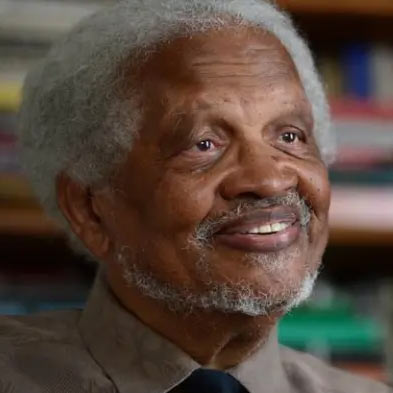Arts-Theater
Playwright Ishmael Reed’s inspired play, “The Conductor,” delivers timely messages

by Bernice Elizabeth Green
When Ishmael Reed, the Pulitzer Prize-winning self-described satirist playwright, tells a story, it is told, and the message is usually delivered “on time”!
Currently playing through this Sunday, March 26 at The Theater for the New City on 10th Street in the East Village, his limited-run play is titled “The Conductor.”
There is an Underground Railroad station, but not the one of the pre- and Civil War eras. Reed’s train is coming at you full speed straight outta today’s recent headlines. What happened when, as Reed saw it, School Board leaders were sidetracked masterminded by a right-wing civic action group,and the aftermath of it all, is the real-life story that inspired Reed’s work. The game of “advancing regressive policies, the dismantling affirmative action, banning racial justice education, race biting, vituperative confrontations about racial equality and LTBTQ rights” is packed in less than 90 minutes of stage time.



Directed by Carla Black, The Conductor, made its New York City premiere earlier this month. You can catch it from tonight, March 23, through Saturday, March 25, at 8:00 pm each evening or on its last day, Sunday, March 26 at 3:00 pm. The play also is live streamed on the same schedule. is live-streamed on the same schedule.
“The San Francisco School Board Recall refers to a movement in 2021-22 to eject members of the San Francisco Unified School District Board of Education,” noted Reed in a press release about the story. “Voters removed President Gabriela Lopez, who is Latina, board member Faauuga Moliga, who is Pacific Islander, and Vice President Alison Collins, who is Black.”
Reed, in an interview with Our Time Press on Monday, confirmed that “a number of issues were used to pump up local parental ire and to amass conservative political power. Beginning with anger over COVID school closures, it spread to other issues.”
Those issues included:
— An Ethnic Studies and Social Justice Curriculum was attacked as a politically biased, inaccurate portrayal of history.
— A shift at the city’s elite high school from “merit-based” admissions to a lottery process inspired fear in some quarters about losing opportunities for themselves or people who looked like them.
— The Recall was heavily funded by fat cats who supported right-wing policies on masking, charter schools, and vouchers.
— Rhetoric in the controversy contained “dog whistles” that were common to national GOP campaigns.
Sound familiar?
Playwright Reed asserts that backers of the Recall used minority faces to front the effort while remaining in the background. In his no-holds-barred play, a character named Shashi Parmar, a hi-tech engineer and president of Citizens for Excellence in Education, is such a face. His role as a Recall leader is threatened when the downing of a US spy plane over Indian airspace is coupled with growing tensions between the USA and a nationalist Indian leader commonly known as Siraj ud-Daulah. As a result, anti-Indian sentiment rises on the West Coast, and Indian Americans must hide or leave the country. A new Underground Railroad is established to convey Indian Americans to Canada, from whence they could get passage to rejoin family and friends in India.
But to get on this Railroad, you need a conductor–like those who guided slaves northward before the American Civil War. So Parmar finds himself in the hands–and in the house–of the play’s main character, a progressive Black columnist named Warren Chipp, who has lost his job because he supported the Lowell High School admissions lottery. Ironically, Parmar signed the petition that led to Chipp’s firing. Chipp admonishes Parmar, “The sons and daughters of immigrants don’t know (white) people the way (Black people) do. They’re in primary school when it comes to racism. We have a Ph.D.”
Though press accounts presented the conflict as pitting Asian Americans against Blacks, Asian Americans agreed that the elite school in question was the scene of anti-Black and anti-Latino racism. Reed says the play protests the right’s “divide and conquer” tactics and skewers what Reed views as any minority’s shunning of its own culture to “go Anglo.”
You can count on Reed to deliver a message in everything he writes. But, as loud as it may be, it’s not always so plain that one can hear it. And, over the years, his messages are not always the kind of missives people want to hear. (That’s another play, as Reed would say.)
But Reed, on the phone call from his Oakland base to Brooklyn — a stop in his own storied life — delivered a surprise. “Tell your readers that the message of my play is the power of the individual to — not his words but his meaning, I think — stop a moving train. “How two or three people, in this case real-life women like Ms. Lopez and Ms. Collins, can make a difference.” But you really don’t see that in this play, but you can kind of hear it in the distance.
Reed is Reed, and frankly, this writer has no qualms with that. Reed, after all, is a very wise conductor. Whether or not you can get it is not the point. It is a message that everyone should be able to understand, and it is a gift to Brooklyn and everywhere else in the world.
The actors are Emil Guillermo; Laura Robards, yes, granddaughter of Jason; and Brian Simmons, Monisha Shiva, and Kenya Wilson; understudies are Ephraim Kofi Asante, Dimitri Dewes Jr., and Joy Renee LeBlanc.
If you’re lucky, Reed, and partner Carla Blank, may be looking at the same production you’re visiting through the marvels of technology. There’s a chance you will be able to share your thoughts with him immediately after the show.
Brooklyn’s Rome Neal, the Director of the Nuyorican Poets Cafe and a friend of Ishmael Reed is part of the production team.
More About the San Francisco School Board Fracas:
Veterans of the fracas assert that the Recall was a microcosm of a national conservative effort that uses right-wing operatives, outside money, and corporate influencers to prick public opinion. Playwright Ishmael Reed adds that the Recall was promoted with talking points by fellows of the Manhattan Institute, a conservative think tank and that throughout the brouhaha, Collins and Lopez were ridiculed by media sources that would ordinarily have backed them.
Rejected School Board president Gabriela Lopez and rejected School Board Vice President Alison Collins came to NYC during the run of the play and will attend performances.
About Ishmael Reed
Ishmael Reed, who taught for over 35 years at the University of California, Berkeley, is now a Distinguished Professor at California College of the Arts. He is the author of twelve novels, nine collections of essays, fifteen anthologies of criticism, and eleven plays, of which this is the latest. The New Yorker has labeled him “America’s most fearless satirist,” and his exposés often attract bitter criticism. His “The Haunting of Lin-Manuel Miranda” (Nuyorican Poets Cafe, 2019) deconstructed the Broadway play’s abolitionist portrayal of the founding father. Reed’s eighth play, “Life Among the Aryans” (Nuyorican Poets Cafe, 2018), envisioned a future when the downtrodden denizens of the Alt-Right realize they’d be better off if they were Black. Reed made his TNC debut last season with “The Slave Who Loved Caviar,” a take-no-prisoners satire on the exploitation of Jean-Michel Basquiat by art world vampires.
His latest anthology, “Bigotry on Broadway,” co-edited with Carla Blank, was published last fall by Baraka Books. His best-known novel, “Mumbo Jumbo” (1972), was recently released in a 50th-anniversary edition with a new introduction by Reed. His newest poetry collection, “Why the Black Hole Sings the Blues: Poems 2007-2020,” was released from Dalkey Archive Press in 2020. He also founded the Before Columbus Foundation and PEN Oakland, non-profit organizations run by writers for writers.
Reed’s honors include a MacArthur Fellowship, National Book Award nominations, and a Pulitzer Prize, the 2008 Blues Songwriter of the Year (West Coast Blues Hall of Fame), the 2017 AUDELCO Pioneer Award for the Theater, and the 2022 Anisfield-Wolf Lifetime Achievement Award. He was San Francisco’s first Jazz Poet Laureate from 2012-2016. The Reading Group just released a CD, “The Hands of Grace,” in which Reed, also a pianist, songwriter, and lyricist, plays his compositions for “The Slave Who Loved Caviar” and other works, His online literary magazine, Konch, can be found at www.ishmael reed pub.com. His author’s website is www.ishmael reed.org
About Carla Blank
Carla Blank is a director, dramaturge, writer, and editor. After debuting as a dancer and choreographer as part of the Judson Dance Theater Workshop performances in the 1960s, she devoted a portion of her life to working with youth to aged adults in community arts projects. The performance arts handbook, “Live On Stage!,” evolving from this work, was adopted in school districts throughout the US and Canada. She directed Reed’s “Mother Hubbard” in Xiangtan, China, in 2016 and his “The Slave Who Loved Caviar” at TNC last season.

